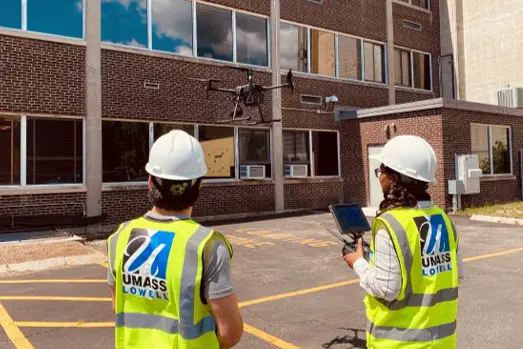Office of Naval Research Funding Supports Universities Advancing Innovative Energy Solutions
 Image by Courtesy
Image by Courtesy
11/20/2025
Media contacts: Brooke Coupal, communications, economic impact and research development specialist, Brooke_Coupal@uml.edu, and Nancy Cicco, assistant director of media relations, Nancy_Cicco@uml.edu
LOWELL, Mass. – The U.S. Department of the Navy is deepening its partnership with the University of Massachusetts Lowell and the State University of New York at Stony Brook to increase energy resilience across naval operations.
Over the past five years, the Department of the Navy’s Office of Naval Research (ONR) has funded both universities in their pursuit of innovative energy solutions that can withstand anticipated and unanticipated disruptions. Most recently, ONR awarded UMass Lowell and Stony Brook a grant totaling $6.3 million to advance technologies in areas such as energy infrastructure and storage to enhance the reliability and accessibility of energy systems on land and at sea.
“This partnership reflects UMass Lowell’s commitment to advancing research that addresses real-world challenges and strengthens our national security,” said UMass Lowell Chancellor Julie Chen. “Working alongside the U.S. Navy, Stony Brook University and our industry partners, our researchers are developing innovations that not only support the nation’s defense but also drive progress in energy resilience and sustainability.”
“Stony Brook University has long been a leader in energy innovation for the benefit of Long Island, the state of New York and beyond,” said Stony Brook President Andrea Goldsmith. “Thanks to our continued partnerships, including with the U.S. Navy, UMass Lowell, Brookhaven National Laboratory and our industry partners, Stony Brook and its innovative researchers are driving transformative solutions to ensure the security and reliability of our critical energy infrastructure. This includes research underway at the New York State Center of Excellence in Energy and the Center for Grid Innovation Development and Deployment, two hubs that exemplify our commitment to advancing a sustainable future for New York and the global community.”
 Image by Courtesy
Image by Courtesy
Researchers at UMass Lowell and Stony Brook are working on 12 projects in four focus areas: improved power grid management, structural health monitoring of energy infrastructure, energy storage and materials, and fuels and power systems. The research is being conducted in collaboration with industry partners, including National Grid, PSEG Long Island and the Long Island Power Authority.
Reliable access to energy is critical for the Navy’s operations. By strengthening its energy systems, the Navy can ensure continuous power for critical missions, even in the face of natural disasters, cyberthreats or disruptions to fuel supplies.
“This collaboration creates a powerful exchange of ideas,” said Christopher Niezrecki, principal investigator and professor of mechanical and industrial engineering at UMass Lowell. “By engaging with the Navy, we gain valuable insight into their operational challenges and energy goals. At the same time, the Navy benefits from our technical expertise and facilities, allowing us to advance research in areas that are critical to its mission. Together, we’re developing solutions that enhance energy resilience and national security.”
“Resilient energy systems are vital to the Navy’s readiness and operational success,” added Yacov Shamash, principal investigator and professor of electrical and computer engineering at Stony Brook. “This partnership allows us to bring together cutting-edge research and real-world application to develop innovative solutions that not only benefit the Navy on sea and land but, through our industry partners, strengthen civilian energy infrastructure nationwide."
Congressional leaders from Massachusetts and New York, who championed the grant, praised the funding as an important step in advancing energy innovation and national defense.
“Our military’s energy grid is only as strong as the investments we make in it,” said Sen. Elizabeth Warren (D-MA). “I fought hard to secure this funding, and it’s great to see Massachusetts universities continuing to lead the way in research and the path to energy independence.”
“Federal research investments to universities are critical for our nation’s economy, health and national security,” said Sen. Edward J. Markey (D-MA). “I am proud that researchers at UMass Lowell and Stony Brook are partnering with the U.S. Navy to build resilient energy systems that will improve physical and cyber security, protecting us from an unstable world.”
“UMass Lowell continues to prove that groundbreaking research and national service go hand in hand,” said Congresswoman Lori Trahan (D-MA). “By partnering with the Navy and Stony Brook to develop resilient, secure energy systems, they are strengthening our national defense, supporting good-paying jobs, and driving innovation right here in Massachusetts. This federal investment will ensure that the technologies developed in our backyard help power critical missions at sea and modernize energy infrastructure across the country.”
“The Office of Naval Research’s investment in Stony Brook University and UMass Lowell represents the best of how federal research partnerships can strengthen our national security and drive innovation”, said Sen. Kirsten Gillibrand (D-NY).” By advancing next-generation energy systems, Stony Brook is helping ensure our Navy has the tools it needs to meet the challenges of a rapidly changing world.”
